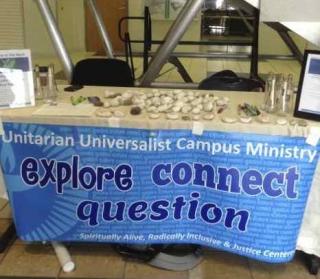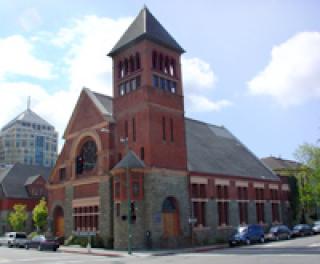Why College Campuses Need UUs!
They say that many times as a minister you preach the sermon you need to hear. Well that was true for me on Friday July 18th when I delivered a homily on hope as part of the closing worship at the National Campus Ministry Association’s annual summer gathering. During the service a parable of Jesus was read about the farmer who went out to sow some seeds.
You may know this parable if you have experience with the Christian tradition, and you may remember that some seeds were eaten by birds, some sprouted but then withered and died, some plants were choked by thorns, but others thrived, multiplying thirty, sixty and a hundredfold. This metaphor seemed perfect for campus ministry: some ideas never get off the ground because the birds of reality swoop in, some seem to be taking off but quickly wither, others are choked by the weeds of over-scheduled students or leadership transition or financial need. But those that do take firm root are so life-giving that it is worth continuing to scatter those seeds.
The conference was attended by a small and dedicated band of campus ministers from a variety of Christians traditions. I met UCC, Presbyterian, Methodist, Baptist and ecumenical ministers over the few days we spent in St. Louis.
Plus there were five other Unitarian Universalists present: Rev. MaryHelen Gunn, a spiritual advisor at Northeastern University, Doug Jones from the Channing-Murray Foundation at University of Illinois, Kevin Lowry who runs the UU group at the College of Wooster, Craig Rubano who leads the UU group at Princeton and does youth and young adult ministry at the UU Congregation of Princeton, and Rev. Evan Young from United Campus Ministry at Ohio University.
At the conference we learned about the motivations and goals of college students and the new role religion can play on college campuses. The speakers were Dr. Tim Clydesdale, a professor of sociology whose research focuses on the post-high school transition, and Drs. Rhonda and Douglas “Jake” Jacobsen, co-directors of the Religion in the Academy Project.
Based on his research across the country, Tim painted us a picture of the statistically typical American first year college student: focused on navigating relationships, managing gratification and figuring out how to live life out of the childhood home. About 80% see college as a hurdle to be jumped in order to achieve a more lucrative career and classes are viewed almost as a form of hazing. They are motivated by our consumer culture to earn money for going out with friends and keeping up technologically and many resist any questioning of their own identity, purpose or the status quo.
But, Tim assured us, there is still a remaining segment of the college first year cohort that IS interested in examining the big questions and seeking meaning. For those students campus ministry can have a life changing impact. And the other good news is that as students progress through college, more of them begin to question their assumptions, especially during sophomore year when “what should I major in?” becomes a soul-searching “who do I really want to be?” Campus ministries should have programs and outreach particularly targeted to sophomores, Tim emphasized. For those students who do receive support around vocational exploration and meaning making during college they develop something Tim calls “holy grit.” Holy grit allows students to persevere after graduation in a tough economy toward meaningful work that focuses not only on personal fulfillment but also on changing communities for the better. Rhonda and Jake, on the other hand, were focused on the role of religion at colleges and universities. They took us through a brief and brilliant history of religion and higher education from the Protestant Era where protestant Christianity was at the center of higher education for elites only, the Private Era during which religion was pushed to the edge of campus to make room for Catholicism, Judaism and a wider variety of students, and the Plural Era we’re in now, in which a wide variety of religious traditions and spiritual positions are being incorporated into higher education as important aspects of cultural diversity and crucial lenses for understanding the world.
Rhonda and Jake helped us understand the concept of pluriform religion – the result of religious diversity and fuzziness on what constitutes religion in American society. They showed how pluriform religion overlaps with the goals of higher education in a wide variety of ways from encouraging civic engagement to imparting religious literacy to exploring character and vocation. Colleges and Universities are increasingly aware of the important role of religious and spiritual organizations, especially those that are explicitly inclusive of multiple traditions and viewpoints.
I came away from this conference with an even more keen awareness of how necessary Unitarian Universalist campus ministry is in today’s society. Students need us to provide a counter-cultural space where they can safely explore their values and receive support in grappling with changing relationships and questions of identity. Plus spiritual support can be crucial in dealing with the many prevalent health issues of college life such as substance abuse, STIs, sexual assault and mental illness. Institutions need us because we offer a non-threatening and inclusive approach to faith that encourages diversity and critical thinking. Plus, we can offer programs such as Our Whole Lives to help students make healthy responsible choices about their sexuality in a highly sexually charged context.
We need to be on campus. In a big picture way we need to take steps toward making campus ministry a more viable career choice for UU ministers and we need to figure out financial models so we can send these UU campus ministers to campuses to do this necessary work. I’m working on that.
In the meantime, there are many things your congregation can do! You can follow up with your youth after they graduate, sending them care packages and hosting reunion gatherings for them whether or not they are in college, so they have a sense of connection to their UU community of origin as they navigate that difficult first year out. You can reach out to the nearest campus whether that’s a community college, a big university or a tiny liberal arts school. If you don’t have the resources or connections to start a student group, start building a network of folks on campus who know about Unitarian Universalism. Faculty, Student Life staff, chaplains, counselors, Resident Advisors – these are the folks students interact with and if these “older adults” meet a UU or spiritually seeking student they can send them your way if they know you exist. For more ideas, check out the Levels of Engagement guide for congregations.
Let's keep scattering those seeds! There are plenty of challenges to growing campus ministries but for those seeds that do sprout and grow it is well worth the effort.




